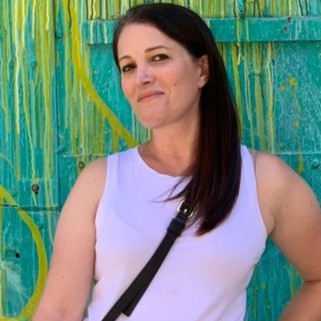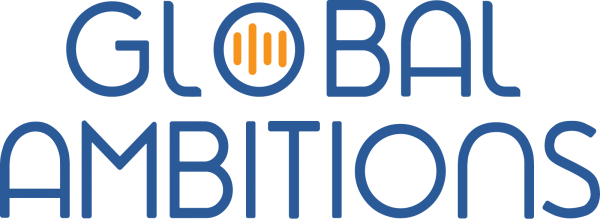With Laura DeCook, the Founder of LDC Wellbeing
Below is an automated transcript of this episode
Antoine Rey: Hi, my name is Antoine Rey and I’ll be your host today for this Global Ambitions podcast episode. And today my guest is Laura DeCook, who founded LDC, a mental health education and awareness company, during COVID and after having worked for two decades in the film tech industry. Laura, welcome to the program.
Laura DeCook: 0:36
Thank you so much. I’m so delighted to be here with you this morning.
Antoine: 0:39
Listen, this is the first time we’re doing a thing on mental health and I’m delighted we’re able to do this with you, and we had the chance to meet you during LockWorld recently, where we had a panel. And let me dive straight into some of the questions we’ve prepared for this episode there. It seems that we’re always still nowadays hearing that in companies there’s a lack of structure for mental health, and in that case, a lot of employees are questioning what do I do? There’s no EAP or ERG or whatever it’s called. Your manager might or might not be the right answer, so is there an HR department? What do you recommend those people do?
Laura: 1:20
Yeah, that’s a great question. So, first and foremost, I know you like to say this as well, but it is okay to not be okay and it is okay to reach out for help, whether that’s in your personal life or if you’re struggling at work with your mental health. I always say, first and foremost, it’s so important if you’re struggling to get professional help. We all know, though, especially here in the US, where I’m based, mental health care is expensive and there’s often a long waiting time to see a therapist, and there are many free resources out there. If finance is an issue in your community, all it takes is a Google search to see what type of low-cost or free mental health resources are available. Here in the Bay Area, I just put in mental health support in my hometown, and this center called the Buckelew Center comes up, and they offer tons of resources for people who are struggling, along with even people who are their caregivers, to get them resources to help their loved ones. I always say do not keep it inside. If you are struggling, one of the worst things you can do is internalize it and ruminate, and keep it inside can be so detrimental to your mental health.
So, regardless of where you’re located, do a Google search. There are even Samaritan helplines in, I think, every country around the world, from the Middle East to Africa, Europe, everywhere there’s going to be support lines or support resources. If your company does not have a mental health employee resource group, think about setting one up, even if it’s just a few people, getting them trained in something like mental health first aid, which we can talk about in a little bit. It could be so important to a company, regardless how big or small your company is, but maybe baby steps, starting with like meditation, mindfulness workshops, even stress management resources we were saying even like just taking a walk, like during a meeting, stepping outside of your home, can be so good for your mental health. So you know it starts small if there’s nothing there, but usually companies will have an employee assistance provider. Nowadays, especially here in the US, you know mental health is included in many of the employee assistance provider resources.
Antoine: 3:49
So I’m glad to hear that there are some free resources out there, because, to your point, I think the worst thing you can do is to bottle it in, even though for some people it’s probably not very easy to talk about it to start with. But suddenly, if there are like anonymous or non-anonymous resources out there, that’s great. What about meditation, mindfulness: do you advise people on that?
Laura: 4:13
Yeah, yeah, I think it’s so, so important to just have any type of thing that you can do for stress relief, whether it’s meditation, mindfulness, even just stepping outside. I always say that just getting some vitamin D, even if it’s freezing, cold winter or where you live, just getting outside breathing some fresh air, it can do wonders for your mental health. There’s all these studies now that just getting out into nature for even like 10 minutes a day can be so helpful for people who are struggling.
Antoine: 4:45
I’d say, even if you don’t have the resources within your company, try to talk around YouTube, friends, family, communities, whatever you can find around that can help you to talk about it. They’ll give you potentially some free and useful advice there. It’s a good way to externalize as well what you’re going through and to your bag to a certain extent, and that would be helpful, I would say. But so what can people do in their company? So if we go back to the world, what can they do in their company to raise awareness or take action?
Laura: 5:20
I always say it starts from the top. It’s especially important to have people leaders or managers or even your upper-level management trained in mental health awareness. I mean, when you’re supporting people, when you’re managing people, that’s part of the gam like you have to make sure you have those skills to deal with people. So that’s why courses like Mental Health First Aid exist so people can find support, know how to reach out if they see someone struggling. We always say that back to our point before just even having a non-judgmental listening ear is so important and if that’s your manager, everybody is going to benefit from that because the employee will feel like they can open up and the manager will be able to support. And we always know happy and healthy employees are the most productive. So, as mentioned before, most companies should have some type of employee assistance provider or EAP that can offer counseling sessions or workshops. Before I also said, employees can start even a small mental health team or create like an employee resource group related to mental health.
It’s important for companies to mark awareness days, like World Mental Health Day in October, and to recognize that and show their employees that they care. Psychological safety is something that’s being talked about a lot these days in the workforce and senior leadership can do, can create psychological safety by modeling open communication and encouraging leaders to even share their mental health journeys. In my previous company, we had all of our directors sharing for World Mental Health Day about their mental health journeys dealing with stress, dealing with burnout, even dealing with depression and anxiety. I mentioned before it really makes business sense to support your employees. Employees with unresolved mental health issues experience a 35% reduction in productivity, which contributes to a loss in the US economies, contributing to a $210.5 billion a year loss in absenteeism, reduced productivity, medical costs. So it makes business sense.
Antoine: 7:39
Yeah, and I think a company driven by health and mindfulness and things like that we’d always trump and win over a company that’s just driven by revenue numbers.
Laura: 7:50
Exactly exactly.
Antoine: 7:52
And you mentioned psychological safety, like we mentioned it before, but there’s a great book and we’ll put a link in the podcast notes there by Minnet Norman, who’s an author who’s been writing a lot about psychological safety and being a bold, inclusive leader as well, so you can check that link there on our page there. Do you think companies are making progress in helping employees in general, like because you’ve been in it for 20 years now?
Laura: 8:19
Yep, oh, yes, I definitely see it and you know I always say it was one silver lining during the pandemic that people started saying, “Hey, I’m not okay, I’m struggling”. People were more open about their mental health struggles and the conversation has just become more normalized. I feel like every time I turn on the news these days there’s a story about mental health or mental health awareness. And I really do think we’re making progress, because back in the day, back in the day like five years ago, when I tried opening up about my mental health struggles at my company first, it took a lot of guts to, you know, to open up to my manager and say and to HR and say, “hey, I’m dealing with these personal issues, like I need to push back on some work or I might need to take some time off”. Nobody knew what to say or do. It was like a frozen, like, oh my goodness, like she’s talking about something that I’m not comfortable speaking about, and I was even told this is something you talk to a therapist about. This is not like something you deal with at work. You’re here to work and I just remember feeling so like embarrassed in a way that, like it, you know, I ended up, opening up, and this was the reaction. But I feel like it’s just become normalized now to say to a manager I’m struggling, like I’m not doing well, I might need to take a mental health day, or you know, to have managers that say like hey, what’s going on? Like how can I support you? You know it’s not the case everywhere, but talking about mental health now has become more of the norm in many cultures around the globe now.
Antoine: 10:01
Good, and can you talk to us then, because this is what you do now. Then they are like you have a number of workshops that you organize in companies, training managers and executives, right?
Laura: 10:10
Yeah, yeah. So through my company, LDC Wellbeing, we teach a number of mental health awareness and education workshops to organizations throughout the globe. We do teach mental health first aid certification, which you heard me speak about in the beginning of the podcast. So this is a course that teaches someone how to recognize the signs and symptoms of someone struggling with a mental health or substance use condition and how to provide appropriate initial support until professional support can be obtained. So we are not teaching in this class, you know, how to become therapists or counselors. We’re teaching someone how to be the first line of support. Or we talk about early signs and symptoms, worsening signs and symptoms and then crisis situations.
It’s still stigmatized in society to openly talk about suicide or suicide ideation, but it’s an epidemic, so we need to talk about it, and we find that most people when they’re asked directly if they are thinking of taking their lives, they feel relief, like someone actually cares about me and someone wants to know. And it’s a deterrent usually for people that they’re able to openly, you know, speak about their struggles and get pointed to appropriate professional or self-help resources. So we don’t shy away in my class about talking about crises and that’s how we save lives is by, you know, being open and honest and saying, “Hey, I’m struggling, I’m not doing okay”, and most often it just takes a nonjudgmental listening ear for someone to be able to like offload and just feel like “gosh, I feel so much better that someone listened to me and someone cared enough about my wellbeing”. We do three lunch and learn workshops. So that’s a six-hour certification class with two hours of prework so it’s a commitment but you get a certificate similar to physical first aid. We teach three lunch and learns ones called Let’s Talk About Mental Health, where it’s really destigmatizing the conversation, talking about anxiety, depression, health care, even suicide. This class substance abuse, overdose, self-care is always a big part of our section of our workshops, because such an issue these days with, like digital, being connected 24/7, so we talk about digital detox, we talk about mindfulness, we talk about self care resources. Like you’re not going to be helpful to anyone else in your life your children, your family, your coworkers, anyone if you’re not taking care of yourself.
So super important. We also teach a workshop on burnout and building resilience because we all know in our 24/7, you know connected society how burnout is an issue for so many people. I dealt with burnout around my eighth year. I was at a company for a decade and I started noticing the signs and symptoms of burnout, burning that candle at both ends, you know being connected, bringing my laptop. You know new events and social events, knowing that, gosh, there might be a work emergency, like I was constantly connected and I knew that was not sustainable, no. We always teach, like resilience, how important it is to learn the skills of resilience and how to, you know bounce back from difficult times. And then our third class is for people managers because you know, as I was saying before, really your manager is so important to your career. I always say you’re only as good as your manager thinks you are. Like, if you have a supportive manager, you’re going to succeed in a company. So this teaches managers how to look out for their teams well, also looking out for their own mental health. So those are the four classes we currently offer, but we do go into organizations and teach them how to build a well-being program. I was an Expedia group previously before starting my company and there was no well-being program at the time, so I built it from a grassroots level, getting people trained in mental health first date around the globe and getting you know these awareness sessions and celebrating these things like World Mental Health Day or Suicide Awareness Day, and just normalizing the conversation.
Antoine: 14:12
I think to your point, that’s the silver lining in the pandemic that has accelerated, unfortunately on one side, for people to fall into mental health issue, but also to create those groups and those training programs within the corporate world and to kind of raise awareness and a sense of responsibility for organizations, I think.
Laura: 14:32
Yes, and they do have a responsibility. That’s hit the nail right on the head there, because companies do have a responsibility. They’re there to look after their employees.
Antoine: 14:43
Right. Well, listen, Laura. That’s all we have time for today. I think this is a fabulous topic to talk about and I hope, like people get some good resources and certainly feel free to connect with Laura. She’s got a wealth of experience here and I think every company could benefit from those trainings there. So, Laura, thank you again for joining our podcast. It’s a pleasure to have you here and we’ll talk again soon.
Laura: 15:08
Thank you so much, Antoine.





